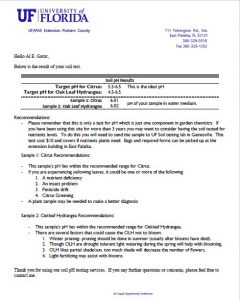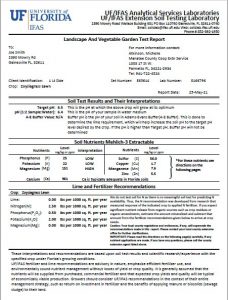Soil testing is a tool for homeowners who are interested in trying to find the right location for or starting a garden in the yard, planting more trees, shrubs, or flowers, or experiencing plant nutrient related issues with landscape plants. Soil testing can help you determine if the pH is in the correct range and if there are any nutrients that are lacking. This information can then be used to determine if the site is optimal for your desired plant(s), or if there is a nutrient deficiency and how much fertilizer to add and how. For a Putnam County Resident there are three tests to choose from. The UF/IFAS Putnam Extension offers a test for soil pH only, and the other two done at the UF/IFAS Extension Soil Testing Lab in Gainesville, one for Soil pH & Lime Requirement the other a comprehensive Standard Soil Fertility Test.
So, which one should you choose? Well, it depends on the level of detail you are looking for and what type of questions you need answer. The following are explanations of the three tests, what situations they are best for and some benefits and considerations.
UF/IFAS Putnam County Extension pH Soil Test

Cost: Free (Limit of 5 per week) Sample Putnam Soil pH Test Results
Brief Description: This is a free service that is conducted by trained Master Gardener Volunteers. This test only provides soil pH.
When to utilize this test: This is a great tool to utilize when you are first looking at planting, especially for plants that are pH sensitive like azaleas or camellias. It is also a helpful for selecting a site for a new flower bed or garden. Soil pH is critical for the uptake of nutrients and to determine if the soil pH matches the desired pH that the plants in consideration prefer. If plants are grown outside of their desired pH range they are likely to exhibit poor or stunted growth, yellowing leaves, and decreased fruit/flower production. It can be used to determine potential nutrient related problems with your plant. For example, azaleas, camellias, dooryard blueberry shrubs prefer acidic soil pH (4.0). However, if they are grown in soils in higher pH range (6.0 and above), these plants will exhibit poor growth and perform poorly.
Benefits:
- Free for Putnam County Residents
- Gives a snapshot of soil pH
- Can help when identifying Nutrient related soil and plant issues
- Good 1st step when planning a flower bed, vegetable garden, or planting a tree
Considerations
- Due to equipment limitations, liming recommendations cannot be provided for low pH soils. All samples that require lime recommendations, should be sent only to the UF/IFAS Extension Soil Testing Laboratory in Gainesville.
- Does not provide nutrient levels nor fertilizer recommendations
- Recommendations may lead to sending samples to the UF/IFAS Extension Soil Lab for additional testing
UF/IFAS Extension Soil Testing Lab- Test A: pH and Lime Requirement Test

Cost: $3 per sample + shipping sample to Soil Testing Lab
Brief Description: This is a service done at the UF/IFAS Extension Soil Testing Laboratory (ESTL) located at UF’s Main Campus. This test will provide the soil’s pH as well as liming recommendations, if appropriate.
When to utilize this test: Like the Putnam County Extension office pH soil test, this is a great first step when you are selecting a site for a new flower bed or a garden. The ESTL has the equipment that allows it to calculate the two different types of pH that are required to determine the lime requirement and recommendation in case the soil requires any lime. This test is best done 4-6 weeks (prior to) before applying lime to an area.
Benefits:
- Gives a snapshot of soil pH
- The report shows the current pH of the soil sample as well as a target pH (depending on intended plant species and use of the area)
- Provides suggested liming rate
Considerations:
- Best done BEFORE planting and liming, but can be utilized to diagnose some problems of established plants
- Liming recommendations are usually given in pounds per 1000 square feet or per acre
- Additional calculations may be needed for smaller areas
- Does not provide nutrient levels nor fertilizer recommendations
UF/IFAS Extension Soil Testing Lab- Test B: Standard Soil Fertility Test
Cost: $10 per sample + shipping sample to Soil Testing Lab

Brief Description: This is a service done at the UF/IFAS Extension Soil Testing Laboratory (ESTL) located at UF’s Main Campus. This test will provide a comprehensive analysis of the soil’s nutrient make up, the soil’s pH as well as provide liming recommendations.
When to utilize this test: This test is very versatile and can be used in many different instances. If used in the planning stages, it can assist in selecting the right plant for the area as well as provide information about any soil amendments needed (such as fertilizers or lime). It can also be used for established plants that may not be growing as expected or if there are any signs of nutrient deficiencies. For vegetable gardens, it is suggested that this test is done before planting and at least every 2 to 3 years thereafter, although every year is preferable.
Benefits:
- Gives a snapshot of soil pH
- The report shows the current pH of the soil sample as well as a target pH (depending on in intended plant species to be grown and use of the area)
- Provides:
- suggested liming rate
- the level (amount) of 8 Nutrients (Phosphorus, Potassium, Magnesium, Calcium, Sulfur, Copper, Manganese and Zinc)
- direct interpretation for Phosphorus, Potassium, plant species to be grown and Magnesium informing you if the levels are Low, Medium or Hight
- additional information on how to interpret Sulfur, Copper, Manganese and Zinc (considered micronutrients)
- fertilizer recommendations in pounds per 1000 square feet to apply in one year
- important directions to provide you with more direction in utilizing the information in the test
- contact information of your local UF/IFAS Extension Agent that can answer any questions about your test
Considerations
- Best done 4-6 weeks BEFORE planting and liming, but can be utilized to diagnose some problems of established plants
- Recommendations are usually given in pounds per 1000 square feet or per acre additional calculations may be needed for smaller areas
- More calculations will be needed to determine the amount of the fertilizer you purchase to meet the recommendations of the soil test (for example how much of an 8-2-12 fertilizer is needed to provide 8 lbs of potassium per 1000 square feet per year)
Conclusions
Knowing the type of information you need will help in choosing which soil test is right for you. For planning purposes, the best test would be the comprehensive Standard Soil Fertility test. If you are needing assistance with diagnosing a plant problem the local pH test may be a good first step. If you are unsure which test to use or need help interpreting your results, your local Extension Office can connect you to an Agent that can provide more guidance.
For more information:
- Preplant Soil Assessment for New Residential Landscapes in Florida
- Soil pH and the Home Landscape or Garden
- Soil Sampling and Testing for the Home Landscape or Vegetable Garden
- Hoja de Información: Análisis de Suelo de Jardines y Huertos
To access PDFs of the test forms please visit:
- UF/IFAS Soil testing Lab Landscape and Vegetable Garden Test Form
- Putnam County Residential Landscape Vegetable Garden Soil pH Test Form
 0
0
